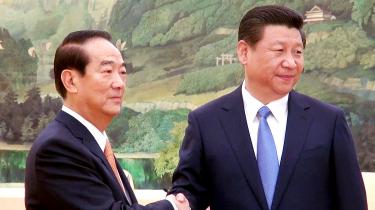PRC’s Xi declares ‘four noes’ on Taiwan
UNHAPPY:Analysts interpreted the Xi Jinping-James Soong meeting as a rebuke to the Ma administration for its inability to implement the service trade agreement
By Peng Hsien-chun, Chen Hui-ping and Stacy Hsu / Staff reporters, with staff writer and agencies
Chinese President Xi Jinping (習近平) yesterday made an indirect response to the concerns voiced by the Sunflower movement protesters against the controversial cross-strait service trade agreement, pledging to learn more about the needs of Taiwanese, particularly those of ordinary Taiwanese.
Xi made the remarks at a meeting with People First Party (PFP) Chairman James Soong (宋楚瑜) at the Great Hall of the People in Beijing yesterday.
Soong began a five-day visit to Beijing on Tuesday, which set up a platform for Xi to address the growing apprehension among Taiwanese of the creeping economic influence of Beijing.
The student-led movement was launched in protest against the government’s handling of the trade pact, which was inked on June 21 last year and is pending legislative ratification, and to call for effective oversight of cross-strait agreements.
“Based on the concept that both sides of the Taiwan Strait are of one family, there is no difficulty that cannot be overcome as long as each side feels for the other and treats the other with sincerity,” Xinhua news agency quoted Xi as saying. “We’d like to know more about the practical needs of Taiwanese, especially those of the grassroots, and take proactive and effective steps to take care of vulnerable groups and to ensure more Taiwanese can benefit from cross-strait economic interaction and cooperation.”
Despite his seemingly soft stance on Taiwan’s growing youth activism, Xi reiterated Beijing’s “unwavering and steely determination” to prevent pro-independence supporters from attempting to “split” Taiwanese society.
The pledge was part of what Xi called China’s “four noes” related to Taiwan, which included three other pledges — it will not change its policy on promoting peaceful development of cross-strait relations, it will not give up its pragmatic approach to seek mutual beneficial results, and nothing will shake its passion to push for the unity of people on both sides.
Democratic Progressive Party (DPP) Chairman Su Tseng-chang (蘇貞昌) dismissed Xi’s remarks, saying that the recent spate of protests had demonstrated the public’s strong desire to determine the future of their own nation.
“The DPP and Taiwanese stand firmly behind the nation’s sovereignty, and the values of freedom and democracy. We insist on living a free and open life,” Su said.
Meanwhile, some political analysts interpreted the Xi-Soong meeting, which they said was held at Xi’s request, as Beijing’s way of demonstrating its discontent with the administration of President Ma Ying-jeou (馬英九) and its failure to implement the trade pact.
Beijing has repeatedly dismissed Ma’s calls for a Ma-Xi meeting.
“Playing two-handed strategies has always been one of China’s fortes. By setting up a meeting with a ‘political goner,’ Beijing was not only able to make a seemingly warm shout out to Taiwanese, but also get back at the Ma administration,” an analyst said on condition of anonymity.
Soong urged the Chinese leader to show “four understandings” when engaging with Taiwan.
“I hope you can understand the ‘Taiwanese consciousness’ when seeking to deepen mutual trust between both sides of the Taiwan Strait. I hope you can understand and know more about the rise of a more autonomous civic consciousness in Taiwan, as our political and social systems are after all much different from yours,” Soong said.
Soong called on Xi to improve his understanding of Taiwan’s democratic system and its pluralistic society, while showing understanding of the problems faced by the owners of Taiwan’s small and medium-sized enterprises, who grew up in a nation whose economy was diversified and independent, and who often had to work away from home.
Additional reporting by Shih Hsiu-chuan

No comments:
Post a Comment